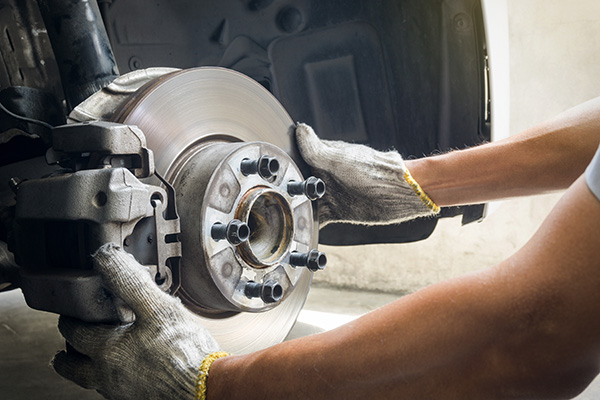
Brake wear is not always obvious from the driver’s seat. Front and rear systems share the work differently depending on speed, load, and the car’s electronics, so knowing which end is wearing first matters.
Here is a clear way to distinguish between front and rear wear, understand the most common clues, and know when to schedule service before small problems become bigger ones.
How Brakes Share The Work
Most cars send more braking force to the front because the weight shifts forward when you slow down. That is why front pads typically wear faster. Rear brakes stabilize the car, keep it straight, and help with parking brake duties. On vehicles with electronic brake distribution, hybrids, or strong stability control, the rear may do more than you expect, so rear pads can wear nearly as fast as fronts.
Signs That Point To Front Brake Wear
If the steering wheel shudders when you brake from highway speeds, the front end is the first place to look. Pulsation felt mostly through the wheel often points to front rotor thickness variation or hot spots. A faint squeal at low speed that disappears when you press the pedal a bit harder can be a front wear indicator tab touching the rotor. You may also notice more nose dive during stops or longer pedal travel as the fronts thin out and heat up faster.
Clues That Suggest Rear Brake Wear
A light scraping or whisper from the back of the car when rolling slowly in a parking lot often comes from rear pads nearing the end of their life. If your car uses the rear brakes for the parking brake, a weak hold on a gentle slope is another hint. A soft, low pedal that improves after a quick second press can indicate rear pad knock-back or rear caliper slide issues. In wet weather, a brief grind from the first stop of the day can be normal rust dust, but if it continues warm and dry, the rears deserve a look.
Simple Driveway Checks You Can Do Safely
- Park on level ground, set the parking brake, and chock a wheel before checking.
- With a flashlight through the wheel spokes, look for the outer pad’s thickness. Anything near the backing plate or thinner than a few millimeters needs attention.
- Compare left to right. One thin pad and one thick pad on the same axle suggest a sticking caliper slide or guide pin.
- Smell for heat after a short drive. A hot, sharp odor at one wheel is a classic sign of a sticking brake.
What Noises Really Mean
A high, steady squeal that starts at low speed and rises slightly with wheel speed often comes from a wear tab, which is designed to warn you before pads are fully gone. A grinding, metallic growl is more serious and usually means the pad material is exhausted on one side, allowing metal to contact the rotor. A single click when you first apply the brakes can be normal pad movement in the bracket, but repeated clunks over small bumps suggest loose hardware or worn bushings that should be inspected.
Brake Feel And Pedal Behavior
A healthy system has a firm pedal that holds its height at a stop. A pedal that sinks slowly can indicate a hydraulic problem and should be checked soon. If the pedal feels fine around town but gets long after a long downhill, the pads may be thin and overheating. A steering pull during braking often traces to uneven front braking, while a rear-end wiggle or light ABS activation at modest stops can point to rear imbalance or a contaminated rotor.
When To Schedule Service
If you see pad material thinner than a few millimeters, hear grinding, feel a strong shudder at highway stops, or notice a wheel that runs hotter than its mate, it is time. Also, if a brake warning light appears or the parking brake struggles to hold, move your appointment forward. Bringing in the car while pads are low but rotors are still healthy can save you from replacing extra parts.
Get Brake Confidence With Accomplished Auto In Concord, NH
If you are unsure whether the fronts or rears are due, we can tell you in minutes. Our technicians measure pad thickness, check rotor condition and runout, free and lubricate slides, and road test so the pedal feel is firm and the car stops straight.
Schedule a brake inspection with Accomplished Auto in Concord, NH, and get clear answers along with smooth, quiet stopping.